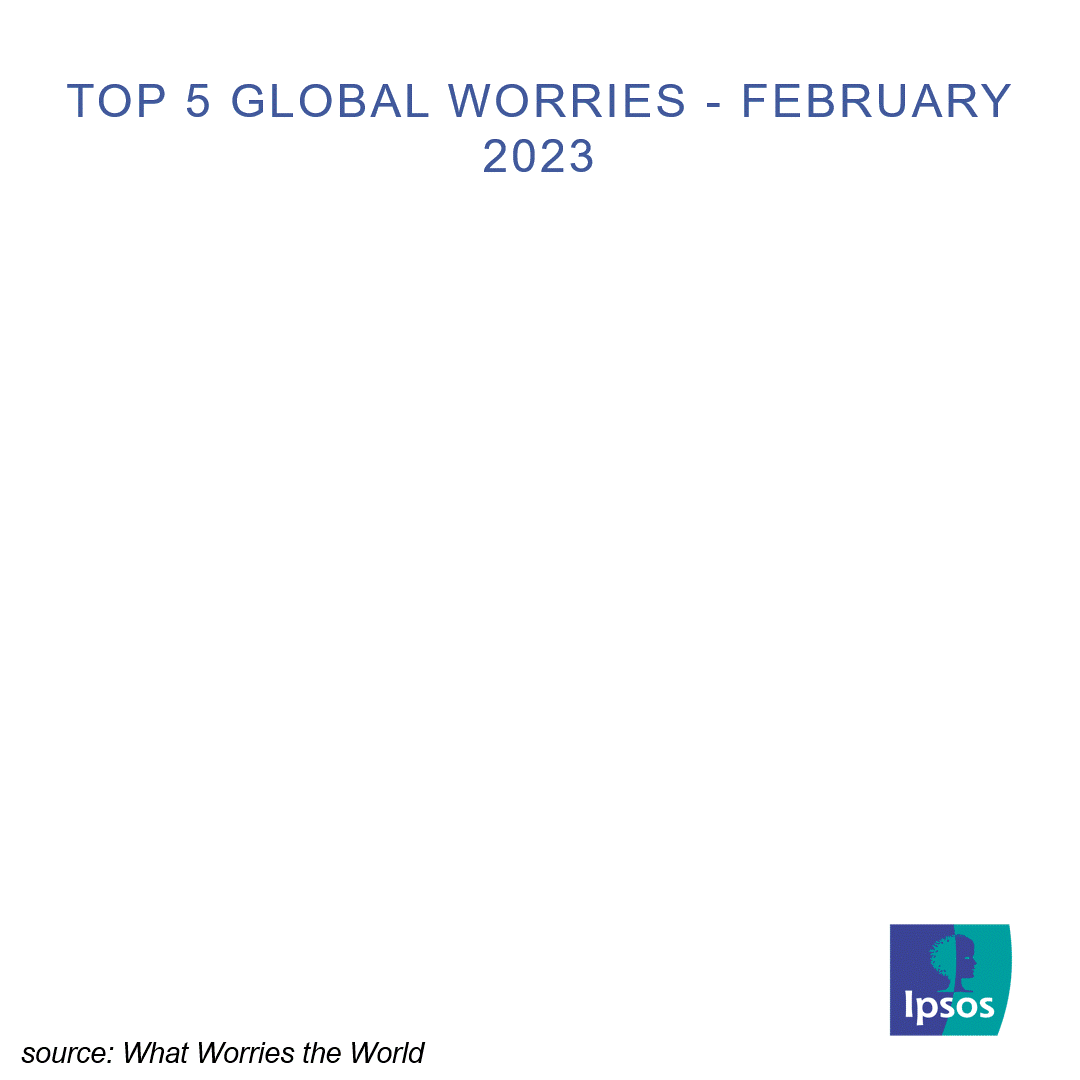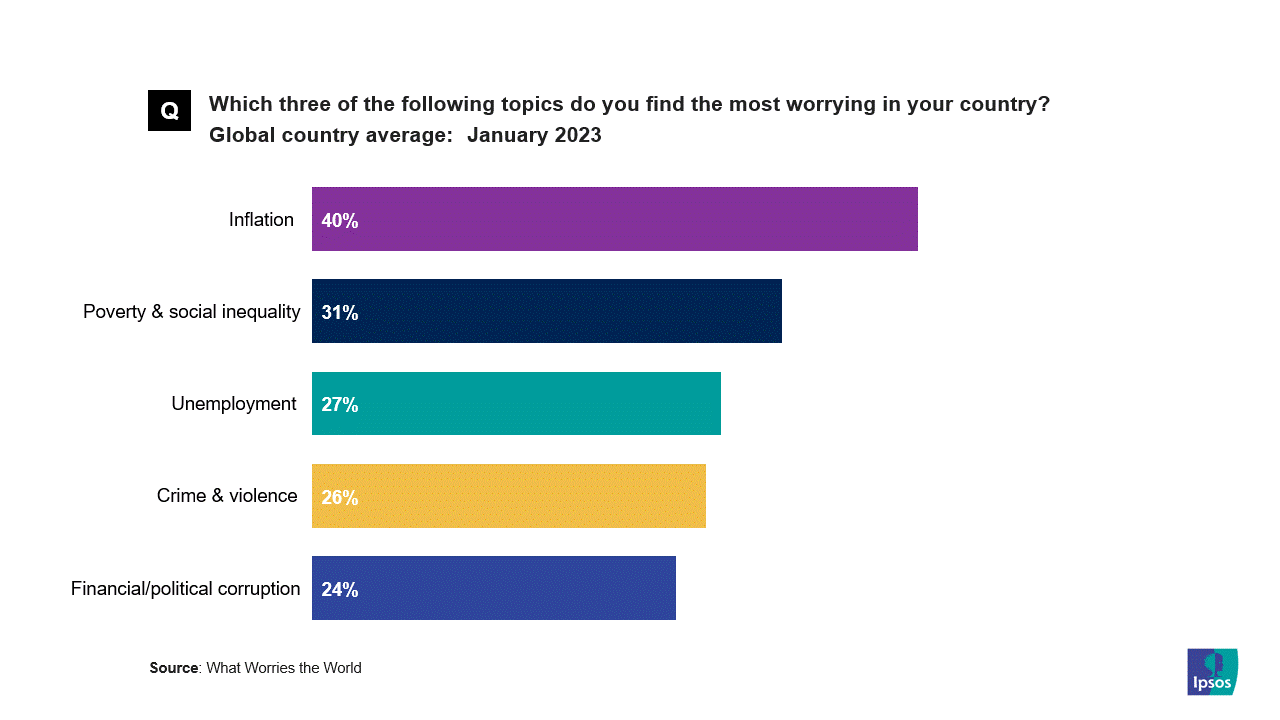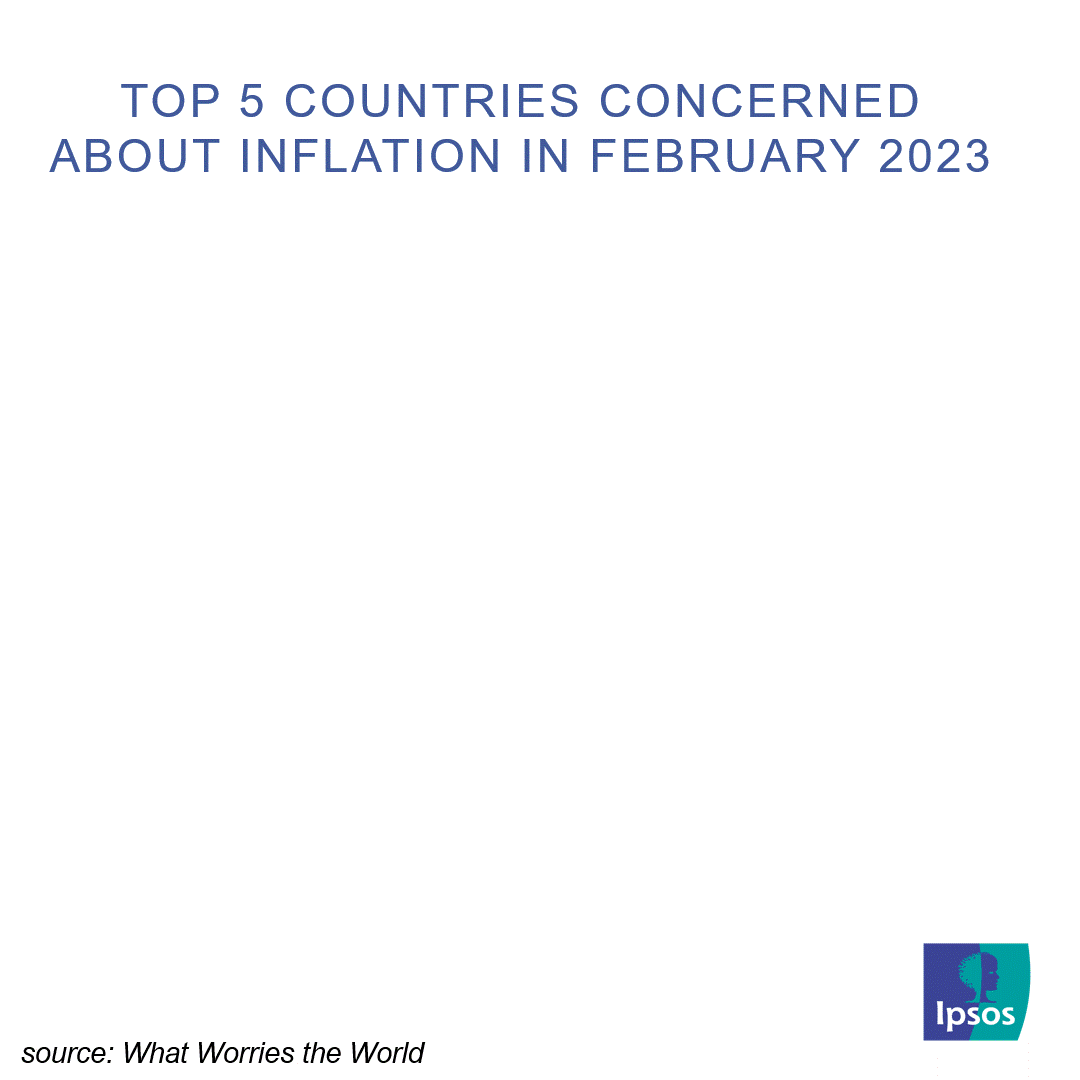What worries the world – February 2023
Inflation is the number one concern globally for the 11th month in a row, with 43% across 29 countries choosing it as a top worry. There have also been small increases in worry for inequality, crime and violence, and corruption. The proportion saying their country is headed in the right direction has fallen by 2pp this month, down to 38% in February.
Our monthly What Worries the World survey explores what the public thinks are the most important social and political issues, drawing on more than ten years of data to place the latest scores in context. This wave was conducted between January 20th, 2023 – February 3rd, 2023.

Key findings:
- Inflation is the number one concern globally for the 11th month in a row, with 43% choosing a top worry in their country.
- 15 countries - Argentina, Australia, Belgium, Canada, Colombia, France, Germany, Great Britain, Hungary, India, Poland, Singapore, South Korea, the US, and Turkey – choose inflation as their top worry.
- Across all countries, worry about inflation is followed by poverty & social inequality (32%), crime & violence (27%), unemployment (27%), and financial & political corruption (25%), which together make up the top five worries.
- Worry about coronavirus has fallen to its lowest recorded level (9%) since it was added to What Worries the World in April 2020.
- Almost four in ten (38%) say their country is headed in the right direction this month. Brazil has recorded its highest ever right direction score in February (56%).

Right direction vs wrong track monitor
Almost two-thirds (62%) across 29 countries say their country is headed in the wrong direction. February’s score is up 2pp compared to January’s figure. 38% feel things are moving in the right direction.
Brazil has seen the biggest increase in their right direction score this month, up 8pp to 56%. This is the highest right direction score for Brazil and the first time more Brazilians think their country is headed in the right direction than the wrong one.
Marcos Calliari, Country Manager, Ipsos in Brazil, highlights that, while each new government sees a rise in positivity about the country, the beginning of President Lula’s second term in office is bringing greater optimism:
“People are seeing this moment as the closing of an extremely challenging chapter in our history: Covid – even though the pandemic has not been completely eradicated, its impact is infinitely smaller than it has been for the last three years. This week, for example, Brazil experienced for the first time, since the beginning of pandemic, the first 24 hours without a single death caused by Covid.
“This feeling of "end of the pandemic", alongside the new Government, reinforces the perception that the country is improving. We should also consider the fact that the previous Government suffered harsh criticism for its general management, even among some important groups of supporters, although Brazil still remains extremely polarised and divided. Last but not least, amongst part of the population, there is certainly an emotional memory of the last time President Lula was Commander-in-Chief, as a period when Brazil enjoyed great economic growth as well as a considerable reduction in the indicators of social inequalities – the same inequalities that continue to be the main worry of Brazilians as we can see in our What Worries the World report.”
Singapore, a new country in What Worries the World this month, has the highest number of people who think the country is headed in the right direction (79%). Peru has the lowest number of those who think it’s going down the right path (10%).
Inflation
Over four in ten (43%) globally say inflation is one of the biggest issues affecting their country. It has now been top out of 18 issues for the last 11 months. This time last year it was the sixth biggest concern globally, with 23% saying it was a top issue.
Worry is highest in Argentina, with 70% choosing it as a concern. This the second highest level of worry we’ve seen on inflation for any country since it was added to What Worries the World in 2013. The highest was in August 2022, when 71% of Argentinians choose inflation as one of the country’s biggest worries.
In February 2023, Colombia (51%), France (50%), and Australia (50%) have all seen their level of worry about inflation pass one in two for the first time.
Hungary (58%), Canada (55%), the US (52%), South Korea (41%) and Italy (36%) all record their highest level of concern to date about rising prices.
This month 15 countries have the cost-of-living crisis as the number one concern in their country: Argentina, Australia, Belgium, Canada, Colombia, France, Germany, Great Britain, Hungary, India, Poland, Singapore, South Korea, the US, and Turkey.

Unemployment
Worry about unemployment is fourth on our list of concerns, with 27% saying it is an issue in their country.
South Africa remains the most concerned country with 69% picking it as a worry, the highest score it’s recorded on this issue. South Africa has been top when it comes to worry about jobs since April 2021 and during that time concern has not fallen below 60%.
Kelly Arnold, Country Manager, Ipsos in South Africa, explains the long-term issues around a lack of jobs: “The causes of unemployment in South Africa go back decades. These problems have been exacerbated by the Covid-19 pandemic, when between 3-4 million South Africans lost their job. These jobs have not come back.
“Now with the cost-of-living crisis people are more desperate to be back in work. Our latest polling finds 70% of South Africans say the cost of living is rising faster than the official inflation rate. For those in work many are seeing pay rises below inflation.
“Whether unemployment will play a big role in next year’s campaigning remains to be seen. Unemployment and education concerns are systemic issues so it will not make/break the voters’ decision but will certainly influence it. Now, top of everyone’s mind is our electricity crisis. This is the hot topic that is causing much debate and controversy.”
The last time a country was more concerned than South Africa about jobs, Italy was top of the list. It now lies in fourth, with 43% choosing it as a worry, a rise of 2pp on last month’s 41%, the country’s lowest ever score on unemployment.
Spain has recorded its lowest-ever figure for worry about jobs. This month’s score of 37% sees it lie eighth out 29 countries, down from second last month.
Climate Change
One in six (15%) globally choose climate change as one of the biggest issues affecting their country. It remains eighth out of 18 issues featured in our What Worries the World survey.
Last month Australia was top out of 29 countries on this issue. However, with concern falling 4pp, it has moved from first to second with Germany top of the list. 28% of Germans are worried about climate change and it is their third biggest concern, behind inflation (40%) and inequality (35%).
Italy has moved into the top five most worried countries about climate change after a 4pp increase compared to January 2023.
Singapore, a new country in What Worries the World in February 2023, is just outside the top five in sixth.
Coronavirus (Covid-19)
After last month’s slight rise in worry about coronavirus, concern about the pandemic has fallen to its lowest recorded level since it was added to What Worries the World in April 2020.
Only 9% are concerned about Covid-19 and it has fallen to be the 12th biggest concern overall, between moral decline and military conflict between nations, down from tenth last month.
Concern remains highest in Asia. With all eight Asia-Pacific countries included in our survey making up the top eight most worried countries.
Japan is the most concerned country with just under one in three (31%) choosing it as a worry. It is Japan’s fourth biggest concern behind taxes (36%), inequality (34%), and inflation (32%).
Singapore
Almost four in five (79%) Singaporeans think the city-state is headed in the right direction. In its first month in What Worries the World, Singapore is the most satisfied country with how things are going. It is well above the global average of 38%, but closely followed by others in the region including Indonesia (77%) and Malaysia (72%).
Inflation is the top worry for Singapore with 63% saying it’s an issue, which ranks it third out of 29 countries. The rest of the top five issues in Singapore are: unemployment (36%), health care (26%), taxes (24%), and climate change (23%).
About this study
Ipsos’ What Worries the World survey tracks public opinion on the most important social and political issues across 29 countries today, drawing on over ten years of data to place the latest scores in context.
20,570 online interviews were conducted between 22 December 2022 and 6 January 2023 among adults aged 18-74 in Canada, Israel, Malaysia, South Africa, Turkey and the United States, 20-74 in Indonesia and Thailand, and 16-74 in all 21 other countries. Singapore has been included for the first time in the 29-country list.



